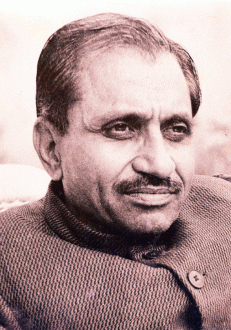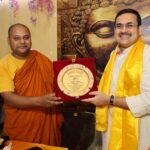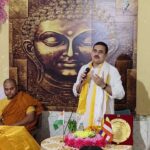BOTH VISIONARY AND PRAGMATIC
- By : Anirban Ganguly
- Category : Articles

Pandit Deendayal Upadhyaya not only advocated Dharma rajya, a state free of inequality and of division, but his stand on non-alignment is well worth recalling today. It was measured, statesman-like and yet also pointed out the gaps and limitations of such an approach
The late philosopher-administrator Chaturvedi Badrinath, (1933-2010) perhaps best summed up the ideal of Deendayal Upadhyaya’s ‘Dharma rajya’, when he wrote, “The agenda of future India must lie, Deendayal Upadhyaya suggests in overcoming social disorder which can be achieved only when India has regained its self. That self lives in its abiding faith in the truth that no social order can survive on the basis of inequality and division. Inequality and division can only destroy human worth, not uphold it. What can uphold and sustain is Dharma. Hence, his vision of future India is Dharma rajya, which is not a theocratic state, nor is there in it inequality and division.”
Upadhyaya’s grounding in the Indian civilisational thought paradigm can be seen from his formulations of a Dharma rajya. Badrinath argues that “From these traditional philosophical principles of Indian civilisation” Upadhyaya derives the political and economic contents of Dharma rajya. The keynote of Upadhyaya’s polity was “de-centralisation, and self-reliance”, while “diversity”, for him was an “inestimable gift of nature” and “Indian life, like nature, has been immensely diverse, where life has expressed itself in different colours, sounds, textures.”
The need for India to evolve its own understanding of the world, the need for it to re-discover its cultural and civilisational roots and to understand the essential shape and expression of its identity and to re-formulate it in the current context were issues that Upadhyaya advocated as he advocated the need to develop our own technologies suited to our societal conditions and achieve technological and industrial self-sufficiency.
He spoke for the marginalised, for the traditional and indigenous landholders, for the farmers and for those who still stood on the last rung of the societal ladder and who needed support and an enabling environment. At the same time, anticipating a debate that would gather steam only a decade after he was dead, Upadhyaya cautioned against an increasing habit of resorting to an ‘eco-destructive consumerism’ and called for the need to evolve or re-discover the fundamental balance between nature and man — a balance that had been stipulated and enjoined by India’s civilisational thought leaders from across the ages. Long before debates on sustainable development had gained momentum, Upadhyaya, in a sense, pointed to the need for focusing rather on ‘sustainable consumption’.
Pandit Upadhyaya’s entire political career spanned the era of the Cold War and the fierce division of the world into ideological and economic blocks. Yet, he refused to be swayed or side with any of these, not in a spirit of an ambivalent non-alignment but rather inspired by the urge to see India genuinely independent and self-reliant. In the early 1960s, India faced its PL 480 phase, primarily because those philosophers and moralist who ruled post-independence, largely ignored the need to enhance India’s agricultural production. The easiest course of action was for the then Indian leadership to appeal to the West to pour the spill-over of its own production on to the Indian bowl.
While the then (1960) Food Minister of India, the formidable SK Patil, prided himself on striking a great deal with the Americans on the supply of wheat, Upadhyaya argued that “while these imports may help us tide our present difficulties, the real solution to the problem” lay in “maximising agricultural production in the country.” Writing in his political diary, Upadhyaya argued that what we want is “our freedom and our food” and that was possible only if we worked for “freedom from foreign food”, because, “dependence on foreign sources will impoverish and entangle us.” Thus, Patil could be showered bouquets, Upadhyaya observed, only when “he succeeds in raising food production in the country and shows to the world that he was the last Food Minister of free India to go round the world with a begging bowl.”
The same spirit of independence and national self-reliance was displayed when he called for defence preparedness as well as defence self-sufficiency and called for a foreign policy that “should be framed with the sole objective of securing the enlightened self-interests of the nation” and to be realistic and take into account the “mundane nature of the world”, in short, esoteric formulations and shallow sentimentalism had no role while charting the course for pursuing India’s national interest on the world scene.
In fact, Upadhyaya’s stand on non-alignment is well worth recalling today. It was measured, statesman-like and yet also pointed out the gaps and limitations of such an approach. It was prescient if one were to keep in mind that it was articulated in 1960.
‘Dynamic neutrality’ argued Upadhyaya, need a leadership of high-calibre to effectuate and make it successful. In his anxiety to justify the policy of non-alignment, pointed out Upadhyaya, “the Prime Minister has often tried to give it a philosophical basis. We Indians have somewhat a weakness for philosophy, and so are susceptible to such polemics. The result has been a kind of sentimental support to Nehru’s foreign policy and not a realisation of our responsibilities on the acceptance of that policy.”
For Jana Sangh, Upadhyaya formulated a “country’s foreign policy (was) formed on the basis of its enlightened self-interest. It is always a policy and not a principle, and, therefore, it can be changed if the interests of the country so demand it. If we have followed a policy of non-alignment, it is because our interests could be best served by it. It is a different matter that those who practised it could not secure the maximum benefit to the country.”
But with an ever-changing geo-political situation, a shifting equation between nation, with aggressors and trespassers on our either side, “non-alignment (could) not be abandoned in this complicated situation” but a more fundamental approach would be, he argued, to “think of measures for a lasting defence.”
Displaying an astute pragmatism, Upadhyaya argued that the talk of non-alignment need not be based on ideological considerations. This policy has nothing to do with our opposition to communism or love of democracy. It is true that on an ideological basis, viewed only superficially, there is much in common between India and the Western world. But it should be remembered that these democratic countries do not formulate their foreign policy on any ideological basis. They care for democracy only in their own countries. As for others, they only care that their own interests should be served best.
Non-alignment, for him, could not succeed “if it continued to be based on fear of displeasing the one or the other. In that case, non-alignment would mean appeasement of one or the other.” Non-alignment to be useful, required a “bold policy, which in turn, needs strength and conviction. Only a strong and self-reliant India can preserve, protect and promote its interests. All steps should be taken towards this end.”

















